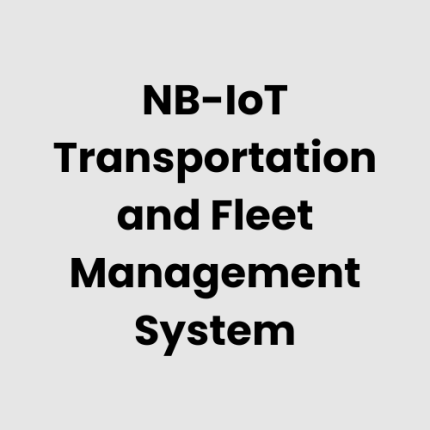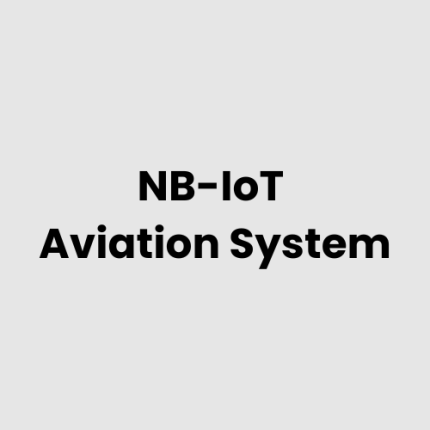Description
Technical Architecture
The NB-IoT Enabled Smart Waste Management System by GAO Tek Inc. offers a transformative solution for waste management, enhancing efficiency, reducing costs, and minimizing environmental impact.
- Device Layer:
Smart waste sensors equipped with NB-IoT modules monitor bin fill levels, temperature, and location. - Communication Layer:
NB-IoT provides robust, energy-efficient, and long-range connectivity between sensors and central servers. - Edge Processing Layer:
Localized processing identifies abnormal conditions, such as fire or unauthorized tampering, and generates immediate alerts. - Centralized Management Layer:
Cloud or local servers aggregate data, analyze trends, and facilitate real-time route optimization for waste collection. - User Interaction Layer:
Web and mobile applications enable monitoring, reporting, and decision-making for waste management professionals.
List of Hardware of the NB-IoT Enabled Smart Waste Management System
- Smart Bin Sensors: Detect waste levels, temperature, and motion inside bins.
- NB-IoT Communication Modules: Provide low-power, long-distance communication.
- Edge Gateways: Aggregate data from sensors and ensure seamless connectivity.
- Centralized Servers: Host data storage and analytics platforms.
- Mobile Tracking Devices: Enable real-time vehicle tracking and collection route optimization.
- Solar-Powered Units: Extend operational life of remote waste sensors.
- Diagnostic Tools: For maintenance and troubleshooting of deployed sensors.
Physical Placement Considerations
- Smart Bin Sensors: Installed inside waste containers, securely mounted to prevent tampering.
- Gateways: Positioned at strategic locations to ensure connectivity, such as depots or high-traffic collection zones.
- Solar Units: Deployed in outdoor bins with sufficient sunlight exposure for optimal power generation.
- Mobile Tracking Devices: Installed on waste collection vehicles for route optimization.
- Centralized Servers: Housed in secure and temperature-controlled data centers.
Hardware Architecture
- Sensors Network: Smart waste sensors equipped with NB-IoT modules monitor key parameters.
- Gateway Infrastructure: Gateways aggregate sensor data and forward it to processing units.
- Edge Processing Devices: Handle local analysis for immediate response to anomalies.
- Cloud and Local Servers: Analyze trends, optimize routes, and store historical data.
- Interfaces: Interactive dashboards and mobile apps for real-time monitoring and analytics.
Deployment Considerations
- Connectivity: Ensure adequate NB-IoT network coverage across the deployment area.
- Power Management: Use energy-efficient devices and renewable power sources for sustainability.
- Scalability: Plan for expanding the network as the number of monitored bins or areas increases.
- Environmental Resilience: Deploy weatherproof sensors for outdoor use.
- Integration: Seamlessly link with existing municipal waste management systems.
- Data Security: Implement encryption and secure access protocols to protect sensitive data.
List of Relevant Industry Standards and Regulations
- ISO 14001 – Environmental management systems
- ETSI TS 137 340 – NB-IoT specifications
- ISO 27001 – Information security management systems
- ANSI/ISA-95 – Enterprise-control system integration
- EN 61000 – Electromagnetic compatibility standards
- OSHA Standards – Waste management and workplace safety
Local Server Version
The local server version of the NB-IoT Enabled Smart Waste Management System provides:
- Offline Functionality: Continuous operation without dependency on cloud connectivity.
- Data Sovereignty: Ensures sensitive data remains within municipal or organizational boundaries.
- Custom Analytics: Tailored insights specific to local waste management needs.
- Enhanced Security: Robust on-site measures to protect operational data.
Cloud Integration and Data Management
The NB-IoT Enabled Smart Waste Management System leverages cloud platforms to enable:
- Real-Time Monitoring: Access to waste levels and collection status across all locations.
- Advanced Analytics: AI-driven insights for optimizing collection routes and identifying waste patterns.
- Scalable Storage: Efficiently manages growing datasets from deployed sensors.
- Cross-System Integration: Seamlessly connects with municipal management platforms and IoT ecosystems.
- Proactive Maintenance: Uses predictive models to flag sensor or system issues before they impact operations.
- Secure Access: Enforces encryption and multi-layered authentication to protect data integrity.
GAO Case Studies of NB-IoT Enabled Smart Waste Management Systems
USA Case Studies
- New York City, New York
Smart waste bins equipped with NB-IoT sensors across New York City notify municipal services when nearing capacity. This system optimizes waste collection schedules and reduces operational costs. GAO Tek’s advanced IoT solutions empower urban centers to adopt efficient waste management strategies. Learn more about smart waste management. - Los Angeles, California
In Los Angeles, NB-IoT sensors track the fill levels of recycling bins. Real-time data helps optimize routes for waste collection trucks, significantly reducing fuel consumption and emissions. GAO Tek’s innovative IoT platforms support sustainable urban waste management. Discover IoT in waste systems. - Houston, Texas
A pilot program in Houston uses NB-IoT-enabled bins in public parks. The system alerts maintenance teams when bins require emptying, ensuring cleanliness and better allocation of resources. GAO Tek brings cutting-edge solutions to enhance city services. - Seattle, Washington
Seattle’s NB-IoT waste management system monitors organic waste bins for urban composting programs. This initiative improves recycling rates and promotes eco-friendly practices. GAO Tek’s expertise supports green initiatives in metropolitan areas. - Chicago, Illinois
NB-IoT sensors in Chicago’s high-traffic downtown areas monitor waste bins, providing real-time data to streamline waste collection operations and reduce overflow incidents. Explore IoT in urban planning. - Miami, Florida
Miami implements NB-IoT waste bins along its beaches to monitor waste levels and ensure timely collection, maintaining cleanliness in tourist-heavy zones. GAO Tek helps municipalities enhance their service efficiency through smart technologies. - Denver, Colorado
In Denver, NB-IoT-enabled systems track hazardous waste bins to ensure timely and safe disposal. This technology helps minimize environmental risks while optimizing operations. Read about IoT in hazardous waste management. - Atlanta, Georgia
Atlanta uses NB-IoT waste solutions in residential neighborhoods, enabling households to monitor waste pickup schedules and avoid missed collections. GAO Tek’s IoT services make smart living more accessible. - Boston, Massachusetts
Boston’s smart waste program leverages NB-IoT to manage snow-removal debris bins during winter months. The system ensures timely collection, reducing potential hazards. GAO Tek provides customized IoT solutions for diverse environmental needs. - Phoenix, Arizona
Phoenix integrates NB-IoT technology to manage electronic waste disposal at designated collection centers. The system optimizes resource allocation and ensures efficient recycling. Learn more about IoT in e-waste management. - Dallas, Texas
Public spaces in Dallas utilize NB-IoT-enabled trash compactors to monitor waste levels and improve collection efficiency. GAO Tek’s IoT innovations ensure cost-effective urban services. - San Francisco, California
San Francisco deploys NB-IoT waste systems to support its zero-waste initiative, improving recycling and landfill diversion rates through real-time bin data. Explore zero waste initiatives. - Orlando, Florida
Orlando’s theme parks employ NB-IoT sensors on waste bins to ensure optimal collection during peak visitor times. GAO Tek helps organizations maintain superior customer experiences through smart infrastructure. - Portland, Oregon
Portland incorporates NB-IoT in its smart city framework, monitoring waste bins in public transit stations to maintain cleanliness and improve rider satisfaction. Learn more about IoT in public transit. - Las Vegas, Nevada
Las Vegas casinos and hotels use NB-IoT-enabled systems to manage waste discreetly, ensuring uninterrupted guest experiences while reducing operational costs. GAO Tek delivers tailored IoT solutions to hospitality businesses.
Canada Case Studies
- Toronto, Ontario
Toronto integrates NB-IoT into its waste management strategy, optimizing bin collection schedules in downtown areas to prevent overflow and improve urban aesthetics. GAO Tek supports cities in achieving smarter urban management. - Vancouver, British Columbia
Vancouver’s NB-IoT-enabled bins support the city’s green initiatives by tracking organic and recyclable waste separately, promoting sustainability and waste diversion goals. Discover IoT in sustainability.
Navigation Menu for NB-IoT
Navigation Menu for IoT
- LORAWAN
- Wi-Fi HaLow
- Z-WAVE
- BLE & RFID
- NB-IOT
- CELLULAR IOT
- GPS IOT
- IOT SENSORS
- EDGE COMPUTING
- IOT SYSTEMS
Our products are in stock and can be shipped anywhere in the continental U.S. or Canada from our local warehouse. For any further information, please fill out this form or email us.
We are actively looking for partners who are like us located in the U.S. and Canada. For more information on partnering with GAO, please visit Partner with GAO Tek Inc. It lists various ways to partner with GAO, such as OEM Partnerships, Technology Integration, Distribution and Reselling Opportunities, Presenting at the Leading Event Tek Summit, Joint R&D Projects, Training and Consulting Services, Industry-Specific Collaborations, Research and Academic Partnerships.



